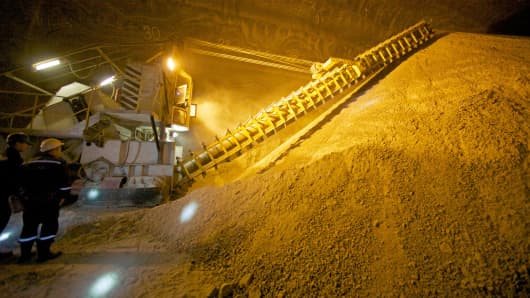Something rare and unusual happened today: a cartel broke itself up.
This happened in the potash industry. Potash is a nutrient that strengthens plant roots and is an essential ingredient in fertilizers.
The dictionary definition of a cartel is "an association of manufacturers or suppliers that maintains prices at a high level and restricts competition."
That is a perfect definition for the potash industry. You doubt me?
- the top six producers control 80 percent of the world's supply;
- the top producers belong to two cartels (they're called "marketing organizations") that negotiate prices and contracts.
Sounds like a cartel to me.
The Russian cartel consists of Uralkali and Belaruskali. The Canadian cartel consists of Mosaic, Agrium, and Potash.
The potash market, like many global commodities, has seen weaker demand than everyone anticipated. It's not surprising: corn prices have come down dramatically from earlier in the year, yet potash prices are still high. Lots of complaints, lots of people trying not to buy potash, and, apparently, lots of cheating on quotas (sounds like OPEC, no?).
Uralkali, which has about 20 percent of world potash production, apparently decided it was tired of its partners cheating on production quotas and is going it alone. This is important, because like OPEC, the cartels attempted to keep prices high by constricting supply.
In other words, price was more important than volume, even than market share.
Uralkali is now signalling that it will attempt to gain market share by dropping price. Cartel falls apart.
This is sort of like Saudi Arabia leaving OPEC, with one big difference: Saudi Arabia has very little spare capacity. Uralkali has a lot. Uralkali, unlike Saudi Arabia, can easily ramp up production.
The immediate effect is a 20 percent drop in the stocks of these companies. There has been estimates that potash prices could drop 25 percent.
Who wins and loses? The losers are the producers and the investors in their companies (sorry).
The winners: this is a win for the world's consumers and farmers. A major cartel that kept prices artificially high has broken up. Food companies will pay less for fertilizers, and consumers will presumably get a break on food costs.
Presumably.
Finally, I was asked about price fixing, as in, isn't this price fixing? It would seem that way, but these are international companies and it certainly is not illegal elsewhere.
Here's an interesting twist on this story: potash producers in Canada have to pay a royalty to the government of Canada based on the price of potash. The higher the price, the more Canada makes. Today is not a good day for Canada.
Remember when BHP tried to buy Potash? That was back in 2010...the Canadian government nixed the deal because it wouldn't provide a "net benefit" to the country. Most believe it was because Canada was concerned that BHP would run up production of production of potash, lower prices, and the Canadian government would get less money.










